Israeli city where Jews and Arabs have lived as neighbours now seeing unprecedented violence
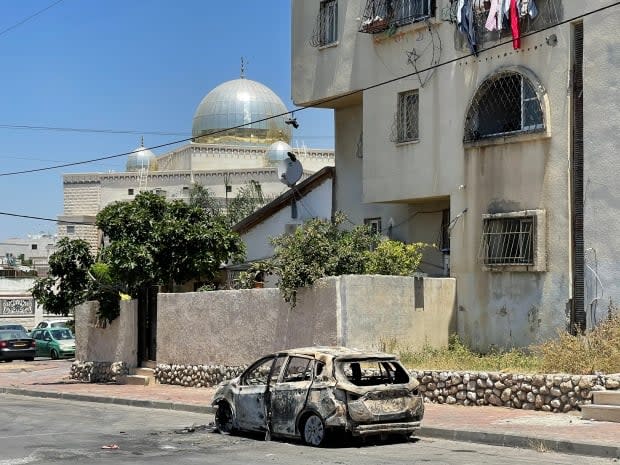
At first glance, the Israeli city of Lod in central Israel seems like it's just shut down for a siesta. The weather is hot, the shops are shuttered and even the call to prayer from a nearby mosque seems ready for a nap.
But the husk of a burnt-out car sits on one street in the centre of town, and there are scorch marks on a synagogue just around the corner from it. An unusually large number of Israeli police officers are stationed on mostly empty streets.
Lod has been under a state of emergency since last week, when a bout of vicious and unprecedented inter-communal violence broke out between Jewish and Arab Israelis.
Suliman Zabarqa is confronting some of the officers leaning against the walls outside his restaurant, also shuttered. He's asking why they stood by when Jewish rioters burned his property.
A Palestinian citizen of Israel, Zabarqa says the police didn't act the way they should have, allowing hard-line Israeli nationalists "from outside Lod" to take the law into their own hands.
Neighbours now frightened of each other
The rioting started after Israeli police broke up a demonstration organized by Palestinian Arab Israelis at the start of fighting between Israel and Palestinian militants in Gaza that began more than a week ago.
A man named Musa Hassuna was shot and killed on May 10, reportedly by a Jewish man. The next day, Yigal Yehoshua, a Jewish man, was hit in the head by a brick and attacked by Arab youths, according to reports. He died on Monday of his injuries.
The anger was out of the bottle. Five synagogues were set on fire while Arab Israelis reported firebomb attacks on their homes. Mobs took over the streets, and the unrest quickly spread to other mixed cities in Israel.
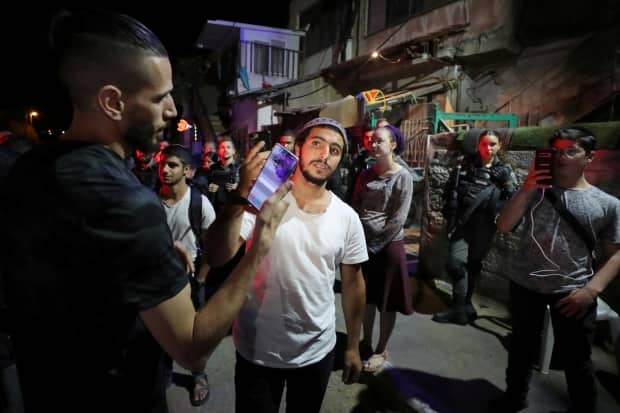
Now, people who once called each other neighbour are frightened of each other.
"I'm scared for our lives. I have two kids, and I'm unarmed," said Tamer Nafar, standing on the edge of a plaza known as the "Triangle of Religions" in Hebrew.
"Look how beautiful it is," he said. "You have a mosque, you have a church, and you have a synagogue."
Nafar is a well-known Palestinian rapper, born in Lod. He's also an activist who says the anger that recently boiled over onto the streets among Arab Israelis is born of decades of racism and discrimination.
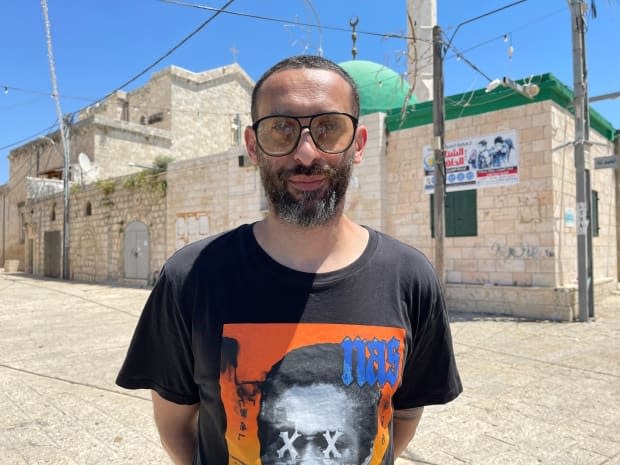
"I mean, Israel doesn't consider me Israeli. The [national] anthem says land for the Jews, ignoring the Muslims," he said.
"The things we are going through here, from housing, from demolishing houses, the media only sees it when it escalates, and we've been trying to create a dialogue for years."
On the second day of rioting, Nafar says, he and his wife witnessed armed Jewish hardliners arriving on the scene.
"So, I call the cops because I'm a f--kin' taxpayer, and they take my money every week."
He says the police eventually hung up on him.
Arrival of settlers has changed city's character
Palestinian Arabs make up about 20 per cent of Israel's population and 30 per cent of Lod's.
But in recent years, there's been an addition to the mix in Lod in the form of hardline nationalist and religious settlers moving to the city, part of the Garin Torani movement.
"The main strategy was to establish settlements in the mixed cities," said Amnon Be'eri-Sulitzeanu of the Abraham Initiatives, an Israeli think-tank promoting equality for Jewish and Palestinian Arab citizens.

"To Judaize those places where there is more Arab presence or there is ongoing conflict between the communities or there is a need to demonstrate Jewish sovereignty or to reclaim, if you like, the area," he said.
The settlers' arrival has slowly changed the character of some parts of the city, and when the rioting broke out in Lod, Be'eri-Sulitzeanu says that reinforcements were called in from Israeli settlements in the West Bank.
Around the corner from the Triangle of Religions, cars pull up to a large yeshiva still bearing the scars of last week's riots.
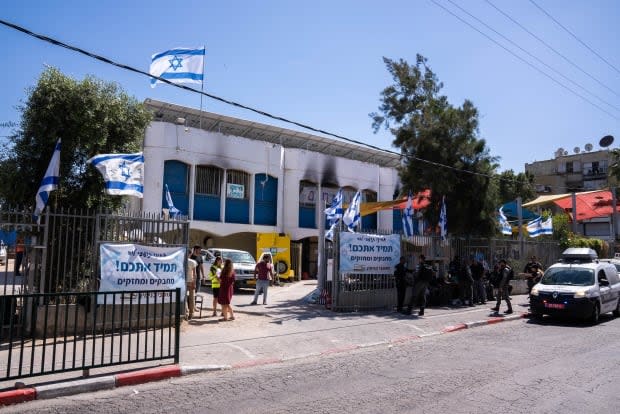
Young men wearing the uniform of nationalist religious Jews — knitted kippas and long beards and earlocks — are arriving for a meeting of volunteers. They're setting up a sort of neighbourhood watch group to protect the property of Jewish families who fled during the unrest.
Police stand guard outside, and blocks of shabby-looking apartment buildings stand opposite, Israeli flags hanging out of some of the windows. Arab women carry groceries into the building and up the stairs.
"We're standing in front of a building [where] two Jewish families and four, six or seven Arab families have been living together for the past 10 years," said Ayelet Wadler, a physicist and mother of six who lives a few blocks away.
"They have been helping each other change tires, carry groceries. And on Tuesday night, on Monday night, suddenly they've had their neighbours who have been living with them for 10 years point out to rioters, 'Here, this is theirs, this is a Jewish car. Burn it.'"
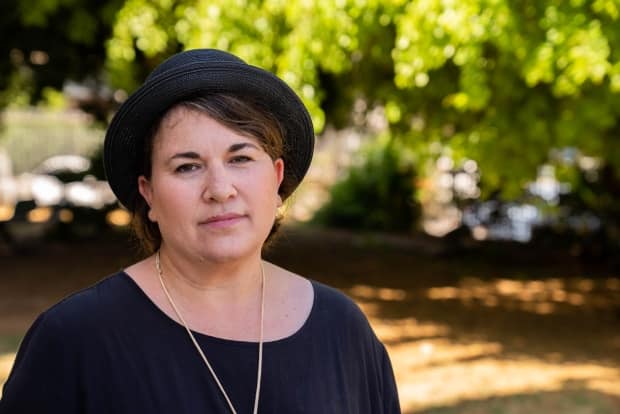
Wadler has lived in Lod for 15 years. She says she believes Arab Israelis are the ones responsible for what happened and is happy to see the men across the street gathering, some of whom stare at bystanders and look menacing.
"I don't see vigilantes," she said. "I see people defending the house."
Wadler says she is extremely distressed that a number of Jewish families didn't feel safe enough to remain in their own homes.
"They were refugees in their own country. That is inconceivable. That's something that cannot happen."
'They are not going away, and we are not going away'
Her failure to connect her comments to the history of her fellow Palestinian citizens speaks volumes about the challenges of reconciliation and understanding in the country.
Palestinians on both sides of the green line between Israel and the occupied territories refer to the creation of the Israeli state in 1948 as al Nakba, the catastrophe. Hundreds of thousands of Palestinians either fled or were forced to flee Israeli troops in the war that came with it.
WATCH | Ongoing conflict amplifies tensions in Israel's mixed cities:
Be'eri-Sulitzeanu says many Jewish Israelis simply don't know the history.
"They don't know that within Israel proper, about a fifth of the Arab population within Israel are internal refugees as well, including most of the Arabs who live in Lod. They themselves are refugees because they arrive in Lod after '48 from destroyed villages throughout Israel."

By the same token, many Palestinian Arab Israelis do not understand the heart-stopping shudder that many Jewish people will have felt at the mention of pogrom-like attacks against Jews.
"Most [Arab Israelis] don't understand the connotation and what I call the pain baggage that we Jews are carrying on our back," Be'eri-Sulitzeanu said. "They are simply not aware of it."
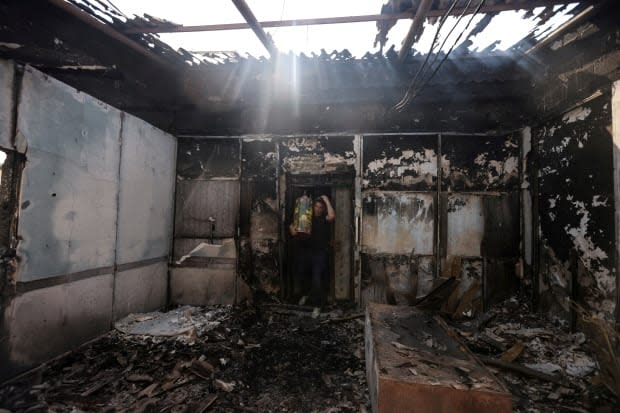
It's hard to imagine how the city will move forward. Be'eri-Sulitzeanu says the Arab-Israeli community's problem is not with the Jewish community in Lod but with the national religious settlers who have infiltrated it.
But they appear increasingly entrenched, a settlement within an Israeli city.
Suliman Zabarqa is convinced it comes down to the local leadership, a mayor that serves only the interests of the Jewish community.
"I live in the state of Israel, and I have rights as any Israeli. But the state doesn't provide me with [them]. I hope the mayor of Lod will treat everyone in the same way. I hope he pays attention to the Arab sector in this town."
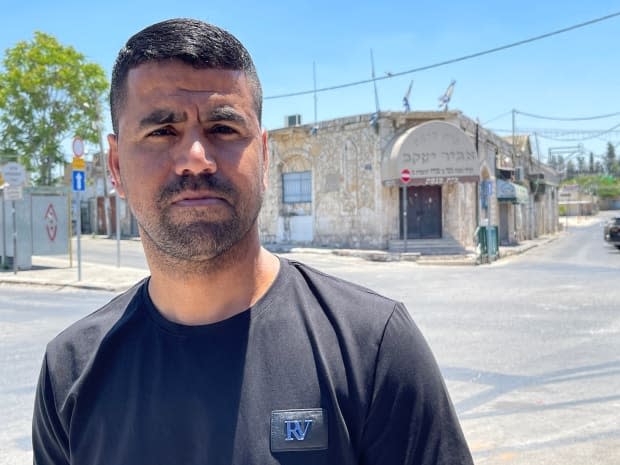
Tamer Nafar says that's a symptom of a much deeper problem.
"When the dialogue between us is 'This is my country, the land for the Jews, not for you,' the whole dialogue has the colour of being superior," he said.
"They need to understand that co-existence needs two sides to exist. They are not going away, and we are not going away."

